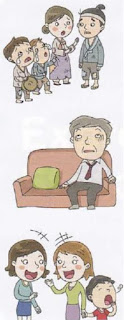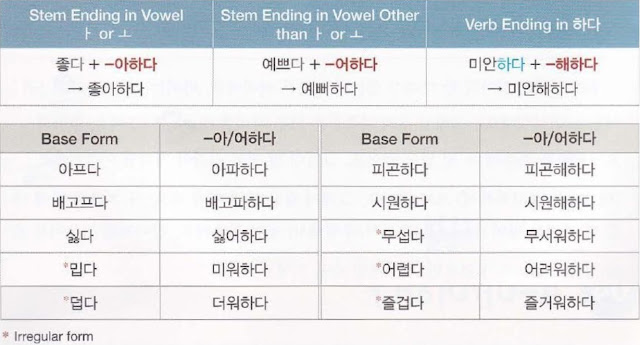 아이들이 배고파해요.
아이들이 배고파해요.
The children are hungry.
요즘 아버지가 피곤해하세요.
Recently, my father has been tired.
아이가 심심해해요.
The child is bored.
Grammar Focus:
-아/어하다 is added to the end of some adjectives to change them into verbs to express the speaker’s feeling or observation about some action or outward appearance. It corresponds to ‘appears (to be)’ or ‘seems’ in English. If the stem ends in the vowel ㅏ or ㅗ, then -아하다 is used. Otherwise -어하다 is used. As for verbs ending in 하다, the form changes to -해하다.
 When adding -지 마세요 to the adjective stem, the pattern becomes -아/어하지 마세요.
When adding -지 마세요 to the adjective stem, the pattern becomes -아/어하지 마세요.
• 무서워하지 마세요. (〇) Don’t be afraid. 무섭지 마세요. (X)
• 어려워하지 마세요. (〇) Please don’t take it so hard. 어렵지 마세요. (X)
Conversation:
A: 왜 부디 씨는 롤러코스터를 안 타요?
Why isn’t Budi riding the roller coaster?
B: 부디 씨는 롤러코스터를 무서워해요.
Budi is afraid of roller coasters.
A: 아이들이 이 게임을 좋아해요?
Do children like this game?
B: 네, 재미있어 해요.
Yes, they find it amusing.
When -아/어하다 is added to 예쁘다 and 귀엽다 to form 예뻐하다 and 귀여워하다, the meaning becomes ‘to hold dear or ‘to treat with love and affection.’
• 할아버자는 나를 귀여워하세요. My grandfather treats me with much affection.
• 동생이 강아지를 예뻐해요. My little brother/sister adores our dog.